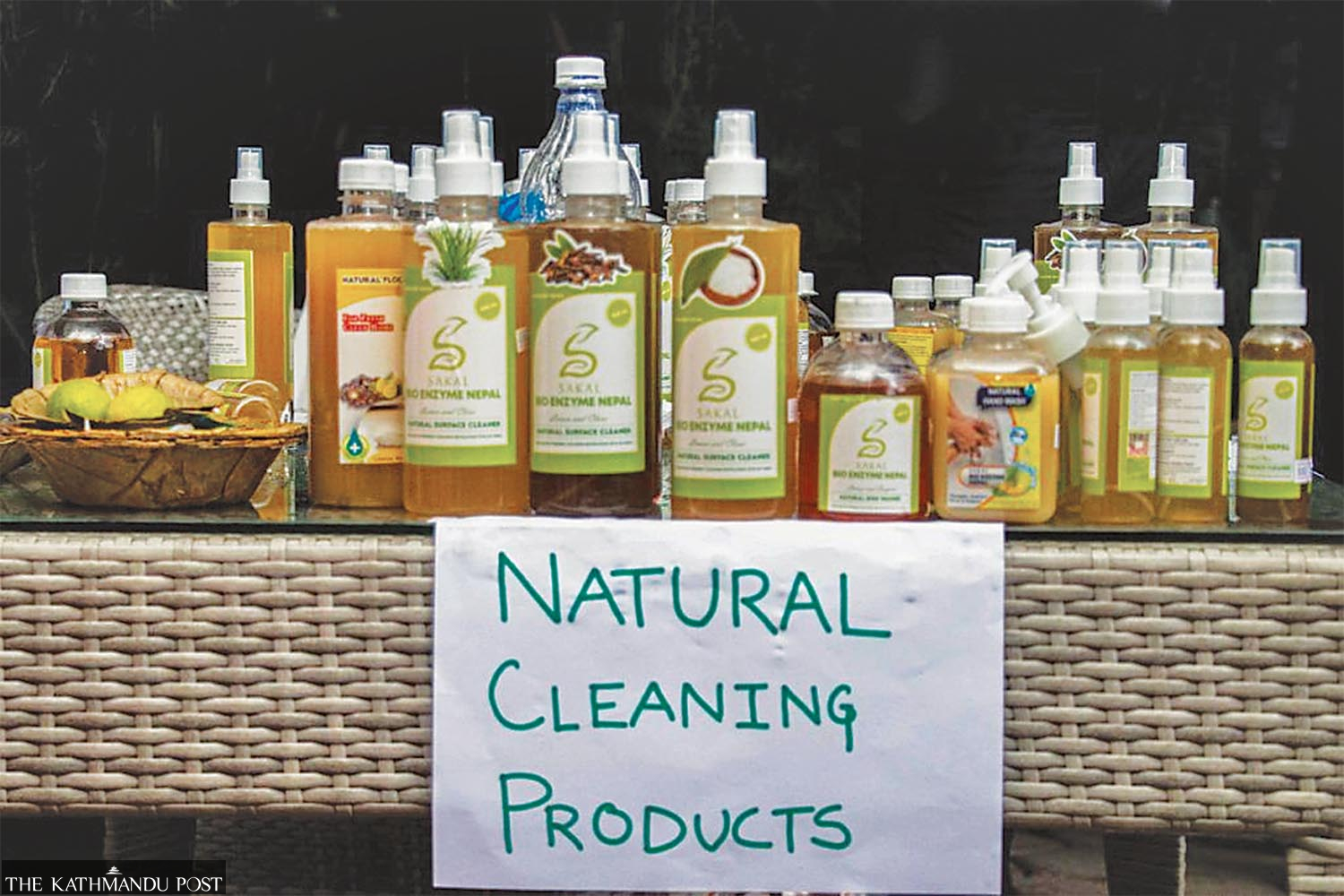Money
These women are determined to make household cleaning products chemical-free
Sakal Bio Enzyme, founded by three women environmental engineers, uses plant enzymes to produce safe household products and reduce landfill waste.
Ellie Davis
Ten years ago, Sarala Maharjan of Harisiddhi, Lalitpur, was told she had just two years to live. Diagnosed with an inoperable brain tumour, she faced a grim prognosis. But instead of succumbing to fear, she began an urgent search for natural alternatives to the everyday chemical products she believed were making her condition worse.
“I was searching for natural alternatives for my survival,” Maharjan said.
That quest led her to bioenzymes—organic catalysts that speed up chemical reactions—and to a journey of discovery that would eventually result in a thriving eco-startup.
At home, she began experimenting with extracts from 47 different plants, developing cleaning agents to replace conventional products containing chemicals like formaldehyde, a widely used colourless chemical in manufacturing processes as a preservative, and naphthalene, a white, crystalline solid that is flammable and smells strongly of mothballs.
In December 2023, Maharjan joined forces with two former classmates from her environmental engineering programme—Sujata Shrestha and Namita Maharjan—to launch Sakal Bio Enzyme, a sustainable household product company based in Lalitpur.
Sakal, meaning “all” in the Newari language, reflects the founders’ ambition of using a wide variety of bio-enzymes extracted from plants to create everyday products that are both environmentally safe and good for health.
For Shrestha and Maharjan, seeing Sarala’s strong entrepreneurial work ethic amidst a health crisis made joining their friend’s startup a no-brainer.
“She [Sarala] is the hardest-working person I have met,” Shrestha said. “She’s our inspiration.”
“We are giving healthy products to society and helping nature,” said Shrestha.
Sakal Bio Enzyme now offers a range of plant-based household products made from organic waste such as lemon and pineapple peels. Its lineup includes a 250ml handwash priced at Rs350, a 300ml dishwash for Rs300, a 500ml surface cleaner for Rs300, and a 500ml floor cleaner for Rs500.
These prices are slightly more than what customers pay for cleaners without all plant-based ingredients, but Sarala and Shrestha say that the extra cost is worth it for the quality of their plant-based ingredients.
“If you are spending Rs500 for a cup of coffee, why wouldn’t you spend that amount on natural cleaning products?” Sarala said.
For Sakal Bio Enzyme customer Anusha Aryal of Baneshwar, the slightly higher prices are worth it. She began using the products a year ago and has since replaced all her household cleaners with them.
“Daily, I’m using the floor cleaner and the natural handwash,” she said. “It’s a bit more expensive than other products at Bhat-Bhateni, but their objective is nice. It’s a sustainable approach.”
At the company’s production facility in Lalitpur, ingredients are fermented to extract bio-enzymes from naturally occurring plant bacteria. According to the founders, these enzymes deliver effective cleaning power without relying on harmful synthetic chemicals.
“We tap different properties from different plant enzymes,” Shrestha explained. “Our products are purely natural. We don’t have to add extra chemical ingredients.”
To minimise its environmental footprint, Sakal Bio Enzyme collects organic waste from local restaurants—primarily fruit peels that would otherwise end up in landfills. Every day, a dedicated Sakal Bio Enzyme staff member collects an average of 3 kg of peels. The company estimates it has already diverted 5 tonnes of organic waste, preventing the emission of approximately 9.45 tonnes of greenhouse gases.
But Sakal Bio Enzyme’s mission goes beyond environmental sustainability.
For Sarala, it’s deeply personal.
Before her diagnosis, she lost both her father and cousin to cancer—an experience that first inspired her to create products free from potentially carcinogenic ingredients. Two years later, she, too, was diagnosed with the disease.
Her improved health after switching to plant-based household items further reinforced her belief.
“Cancer is beyond what we eat,” Sarala said. “Most people only focus on the foods they eat, but they don’t care for what they use on their skin.”
Sarala often relies on traditional wisdom from her grandmother, who used natural ingredients like soap nuts and gooseberries for cleaning. To combine this traditional knowledge with modern science, Sakal Bio Enzyme has brought on two researchers with microbiology backgrounds to help analyse and optimise the chemical properties of plant enzymes for practical use.

Scaling up has been one of the team’s top priorities. They recently began growing their lemongrass instead of sourcing it externally, which has doubled their production capacity.
They also recently launched a lemon-based mosquito repellent and are now working on bio-enzyme-based pesticides and insecticides for agricultural use.
Packaging remains one of their few compromises.
Currently, Sakal Bio Enzyme products are sold in recyclable plastic bottles, but the founders hope to transition to biodegradable packaging soon. Sales happen mostly online and at pop-up markets, but the company plans to expand to physical retail stores.
Their efforts haven’t gone unnoticed.
Sakal Bio Enzyme has received support from several institutions, starting with Coca-Cola’s mentorship programme for women entrepreneurs. Additional recognition followed from The British College’s Startup Fest, Startup Discovery Asia’s Climate Change Competition, and Higher Ground Kathmandu.
They’ve also participated in the Nepal's Industrial Enterprise Development Institute's Nature-Based Solutions Business Incubation Program and have received technical support and mentoring from the Lalitpur Metropolitan City.
So far, they’ve invested Rs2.1 million in the company, using the grants for production machinery and further research. The plan is to use future investments to expand their production and product options.
Last week, Sarala and Shrestha had a chance to present their products to Prime Minister KP Sharma Oli through a partnership with startup incubator Idea Studio Nepal.
“It was an amazing experience for us,” Shrestha said. “He was very much interested in our product and was asking questions.”
As Sakal Bio Enzyme continues to grow, its founders hope their journey can inspire others to reimagine household products—not just as tools for cleaning but as powerful choices for health and sustainability.
Despite the accolades and growing customer base, the team still sees their work as a bold experiment. “Everything that we are doing is our innovation,” Shrestha said. “There’s no proven road for it—we are experimenting.”




 13.12°C Kathmandu
13.12°C Kathmandu













